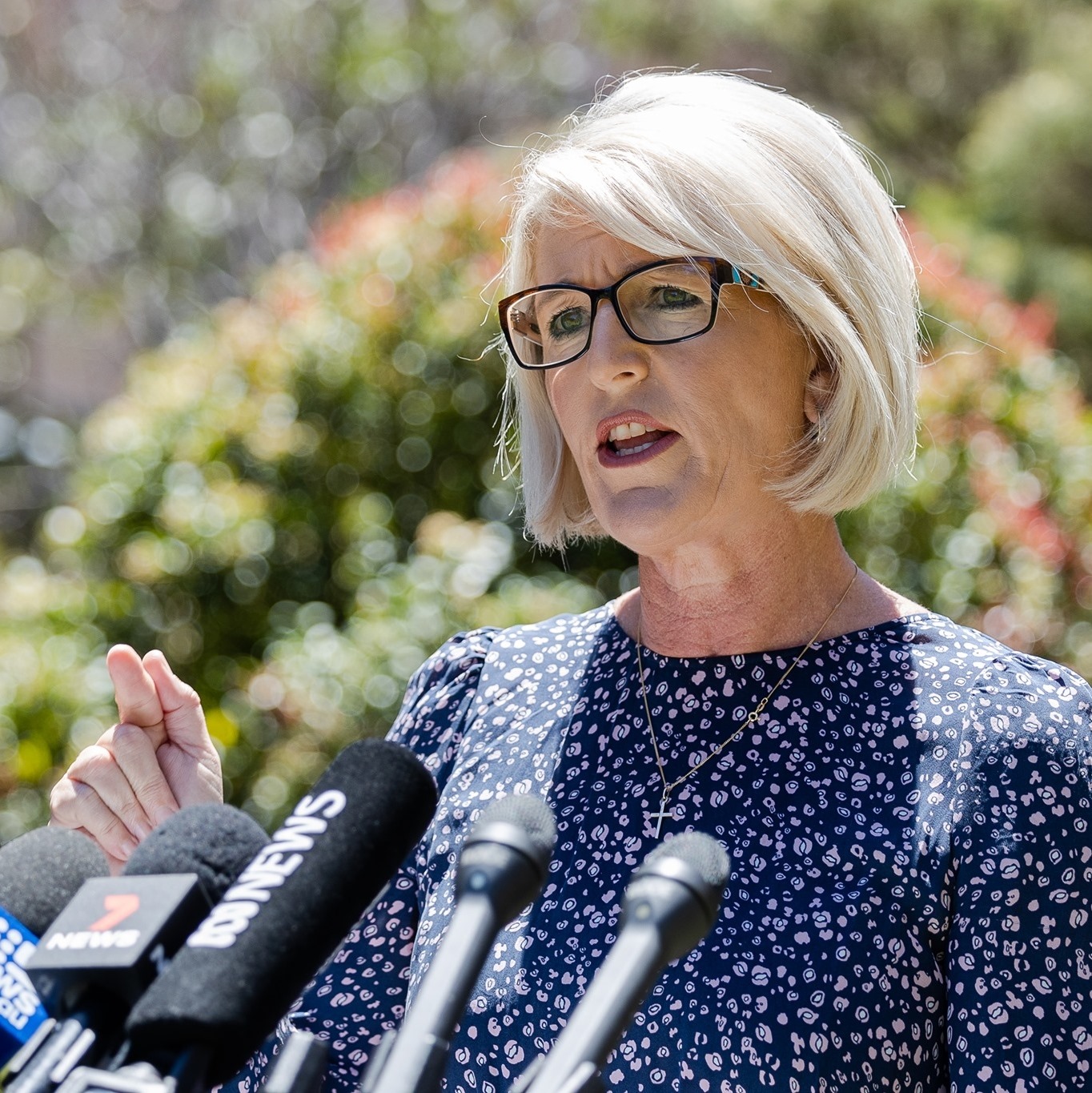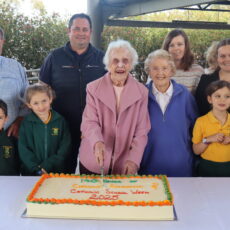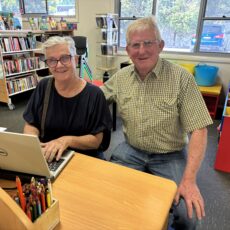Narrabri Shire Council is currently working on its next Community Safety and Crime Prevention Plan for the shire.
“This will be a five-year action plan – identifying ways that council, the community and agencies can ensure council has all the appropriate measures in place for crime prevention and to make sure our region is the safest place it can be,” said NSC manager of tourism and cultural services, Scott Pollock, who is overseeing the plan’s development.
Scott said council has engaged consultants from the University of New England Centre for Rural Criminology to “strengthen our approach”.
He said it will build on the 2019-2023 plan, which was created in consultation with representatives from the Oxley Police District, the Narrabri Shire Crime Prevention Advisory Committee, various service providers, and the local community.
The consultation process is a key part of the plan’s development and Scott urged residents to have their say when it starts in the next month or so.
“One of council’s roles is to be the voice for the community, to advocate for them,” he said.
“What is really important and for this to be effective is when we send out a survey which is just one part of the process – we need to ensure people participate.
“For it to be effective, we need to have an honest and far-reaching view from our community.”
Scott said the process was about gaining an insight into how the community is feeling and there is no such thing as a right or wrong answer when completing the survey.
“For example, questions might be along the lines of – do they think there is a crime problem? What sort of crimes? How common or how severe are they? And where are they happening?”.
He said it was not the council’s job to police crime, but rather “to offer support, where possible, to the community, local police and related agencies”.
Narrabri Shire Council mayor Ron Campbell said it was important residents report crime to the police.
“Anywhere you live in Australia whether it be in the city or the coast or regionally – there will be crime,” said Cr Campbell.
“Resources are always underfunded and there’s always a fight to get more resources to the regions.
“I can assure everyone in the shire that everything is being done with the resources available to deal with crime.
“It is a safe place to live and it’s a beautiful place to live, it’s important we keep an eye out for each other, report the crimes, support authorities and support each other.”
“Essential workers are the backbone of rural communities,” says police minister
The Courier contacted NSW Police Minister Yasmin Catley to ask about crime in rural communities.
“Every incidence of crime is disturbing,” said Ms Catley.
“Everyone has the right to feel safe in their own home and local community.”
Ms Catley conducted a regional tour in late July, and it is understood she intends to carry out more regional visits to talk directly with police and listen to community concerns.
The tour included briefings from local police and organisations across Moree, Inverell, Armidale, and Tamworth.
When asked how concerning it was to hear reports of offences against two essential workers in Wee Waa earlier this year, at a time when country towns are trying to attract professionals, Ms Catley said: “Essential workers are the backbone of rural communities.
“They are incredibly dedicated to the local areas they live and work hard in.
“For something like this to happen, it is quite frankly devastating and unacceptable.
“I know Wee Waa Police, and those right across the Oxley Policing District, do some exceptional work.
“I have every confidence they can investigate incidents that have occurred in the town and support victims and other members of the local community.”
Wee Waa general practitioner Dr Subramaniam Sivanathan and pharmacist Tien On told The Courier they were attacked, in separate incidents, in June.
The victims said they didn’t believe the attackers involved in either incident were youths.
Both incidents were reported to police and NSW Police media told The Courier no one has been charged in relation to either incident.
Dr Sivanathan said he was threatened by an intruder with a knife at his Wee Waa residence in the early hours of the morning on June 6.
“I was asleep, and heard a noise outside,” Dr Sivanathan said.
“I went to see what it was, and this big guy came out from behind a vehicle parked near the house.
“He said he wanted my cash; he had a big knife.
“I tried to reason and negotiate with him; I thought maybe if I could explain I was a doctor – in a war zone a red cross will tell the enemy if someone is a health worker and then they won’t attack – but this bloke didn’t care.”
Dr Sivanathan said the intruder started hitting his car when he was demanding cash and threatening him, thankfully the car alarm went off and the intruder ran away.
Dr Sivanathan has been working in Wee Waa as a general practitioner for more than 20 years and loves the community, he said he is “still committed to the town but does worry for others”.
Pharmacist Tien On was left rattled, explaining how he was robbed for the third time on June 4.
“It happened pretty quickly, I was robbed and assaulted,” he said.
“I got hit in the face, they knocked my glasses, hit my nose and I had a nosebleed.”
Mr On said he returned home from work in the early hours of the morning.
“Yes, it’s not ideal to be working late on a Saturday night but it is the only opportunity to catch up on administration and work that I need to do at the pharmacy, I can’t do it from home.”
Mr On said he parked his car and was crossing the road to his house when he noticed two men getting out of a vehicle.
“The two large men approached me, a large male wearing a hoodie jumper said ‘give me your bags, give me your bags’.
“I had to calculate – did I have time to get back in the car or did I have to face the music … but between the two of them they wrenched two bags out of my hands.
“They made contact with my face, knocked my glasses, hit my nose and made it bleed.
“Instinctively I ducked and that’s when they grabbed my other bag strapped across my body.
“I tried to defend myself, but he was so much heavier, I bounced off him.
“I tried to defend myself but just fell to the ground like a lead balloon.
“I tried to chase them, I made contact with the one and managed to get two items of my clothing back from him before they sped off.
“And then I noticed there were two others coming out of my house.”
Mr On said he was robbed of valuable items including cash and his phone.
“They were very thorough, there were some items of personal value to me, not money, valuable items to me but items that won’t mean anything to them.”
Mr On thanked his neighbour who let him use his phone and helped him get in contact with police and security.
“The response from my customers and the community was very empathetic and it brings me to tears how kind people have been, to be honest,” Mr On said.
“I have given 17 years of my life to the local community, and to be burgled three times, robbed and assaulted, is a gamechanger.”
Mr On has stepped up his security at home and work, but he said he believed improved street lighting, banking facilities, an increase in police resources at Wee Waa station and patrols would help residents feel safer.
“People need to feel secure where they elect to work whether it is temporary or long-term,” he said.
“Maybe the council can help, maybe give the private security guy support so he can have more resources.
Mr On said he thought offenders needed positive role models in their lives to help keep them on track.
“I am a refugee from Vietnam, I travelled to England and then to Australia, I know what it’s like to be disadvantaged.
“I think a mentor and role models help.”
Wee Waa business owner David Johnston is a hard-working and an active community member, giving his time and skills through groups such as the Lions Club. Mr Johnston wants to see the town he grew up in thrive and he has previously given people struggling a second chance through employment opportunities; however, he has concerns about the impact of crime on all rural communities.
“Towns like ours all over Australia are losing people,” said Mr Johnston.
“They are moving to bigger towns because we are losing our services.
“And the crime is another big hit on these already struggling communities. The cost to the community is not just the cost and stress to the victim, it affects the wider community with increased insurance premiums, lower house and property values and the cost of extra security.
“It used to be a safe place in small rural towns once upon a time…you could go to bed with a window open to let some fresh air in, now you must lock up tight and hide your car keys before going to bed.”
As reported previously in The Courier, Member for Barwon Roy Butler said in relation to rural crime, “Unfortunately, this is not just in Barwon, it is not isolated to Wee Waa.”
“It’s really important that crime is reported. It’s hard for the police to push for the resources if the crime isn’t being reported.”
Mr Butler said it was important everyone felt safe in their own home and community, and he was speaking with the government and relevant agencies about matters such as the Young offenders Act, sentencing options and youth programs to address offending behaviour as well as prevention measures such as assistance with life skills from gaining employment to a driver’s licence.
“If a police officer is based in one town, 85 per cent of the shifts should be carried out in that town,” is the view Mr Butler shared with The Courier in late July.
Mr Johnston said he thought “the way the police are re-tasked to other areas and leave our towns without police on duty is a huge part of the problem.
“What happened to the police patrolling the streets at night.”
Police Minister Catley said, “Police resources are an operational matter for the NSW Police, officers are deployed by Commanders on an operational basis to the districts where they are most acutely needed.
“What I will say is that officers are highly mobile and flexible to respond to incidents right across their local district.
“I know police are often tasked to respond to incidents across the Oxley Police District to help meet the needs of all communities.
“I want to assure Wee Waa that this does not diminish the policing response to the local sector.
“Should the NSWPF request further resources, then we will sit down and discuss that.”
Speaking about youth crime, Mr Johnston added, “Youth who are involved in criminal activities need to be taught it is wrong to break the law.
“Simply slapping them on the wrist is teaching them it is okay.
“The government has a duty of care to protect its people.
“They need to invest more in public services in rural Australia instead of relocating services to lager population areas. We in rural Australia contribute huge amounts of money to the Australian economy.
“And we have a basic right to be protected and have access to more government services.”
Mr Johnston added,” I have always said that Wee Waa is good to those that want to have a go.
“There are a lot of people that live here that do so much for others and the town.
“They donate their time and money to helping others in need, without looking for recognition of the work they have done.
“The people in Wee Waa are very open to welcoming new people into town.
“The local businesses, whether they are small or large, also donate money and time to the community by supporting local events, sporting activities and charities.”
Another respected Wee Waa business owner and active community member Kerry Watts said it was “vital” essential workers felt safe in Wee Waa.
“They absolutely have to feel safe in the community,” said Mr Watts.
“They have to feel that the community really wants them here – we can’t afford for them to leave us.”
Mr Watts has lived in Wee Waa for 40 years, he’s an advocate for the region, the people who call it home and the fantastic opportunities it offers residents and newcomers.
He believes providing young people with positive role models plays a key part in keeping youth out of trouble and away from negative influences.
“You won’t solve the problem just by locking young people up.
“The PCYC is good, and the program Chippy (Christen Petersen) is getting started is good.
“The police need to be supported by the judicial system and we have to have a judicial system that understands how to properly care for the youth in crisis.”
Police Citizens Youth Clubs has been running an outreach program in Wee Waa, about once a fortnight at the Sporting Complex since May.
Following a spike in crime, Oxley Police District Superintendent Bruce Grassick attended the March Wee Waa and District Chamber of Commerce meeting and announced a PCYC outreach program would be coming to town.
At the meeting, Superintendent Grassick listened to concerns attendees raised about crime, the judicial process, and discussed ways to keep youth engaged and off the streets to ensure the town stays an attractive place for businesses and people to call home.
While every incident of crime matters, statistics show crime has dropped in the town since March, for example, in the category of break/enter steal – 15 cases were reported in March and by June there were three reported cases in that category and down to zero in July.
Youth related offending issues have decreased in communities where PCYC programs take place, and the Wee Waa U-Nites program has received positive feedback so far.
“If you look at the stats for the last two months or even a bit more, you’ll find that the youth crime rate has gone down in Wee Waa,” said Wee Waa Local Aboriginal Lands Council at a recent U-Nites event.
“I believe that we should have a PCYC permanently here.”
The U-Nites program aims to engage young people in a fun, safe and supervised environment, breaking the cycle of boredom, preventing trouble and offering entertainment such as sport.
Mr Butler has met with the PCYC to discuss how to make the Wee Waa outreach program continue in the town on a more permanent basis, it’s also understood he has met with a Rugby Union group looking to run a youth initiative in town.
Cr Campbell said, “Narrabri (shire) comparatively across the Oxley command has the lowest rate of crime and that is going down.
“There is crime in every community and obviously any victim of crime feels it heavier than others.
“I’ve been a victim of crime.
“All we can do is continue to work as a community.
“We’re (council) doing everything we can outside of catching the criminals, that’s not for us.
“I can assure everyone in the shire that everything is being done with the resources available to deal with crime and to engage government for more resources in the shire.”
“I know the police are doing everything they can with the resources they’ve got.”
An element of the next crime prevention plan is NSC boosting security in Wee Waa, with councillors voting in favour of NSC reporting on the possibility of installing back to base monitoring of council cameras in Wee Waa to allow 24/7 access for NSW Police.
Regarding its timeline, Scott Pollock said: “This report will be due at the end of the year, once it’s complete it will go to council to be assessed and endorsed.”
“Council’s community development coordinator Elodie Labonte will be responsible for implementing the endorsed plan, with support from council’s Crime Prevention Advisory Committee and other staff members.”
To order photos from this page click here









